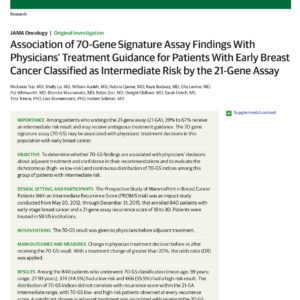PUBLICATION: 
JAMA Oncol. 2018; 4(1):e173470. doi:10.1001/jamaoncol.2017.3470.
AUTHORS:
Michaela Tsai, MD; Shelly Lo, MD; William Audeh, MD; Rubina Qamar, MD; Raye Budway, MD; Ellis Levine, MD; Pat Whitworth, MD; Blanche Mavromatis, MD; Robin Zon, MD; Dwight Oldham, MD; Sarah Untch, MS; Tina Treece, PhD; Lisa Blumencranz, PhD; Hatem Soliman, MD
ABSTRACT:
Importance: Among patients who undergo the 21-gene assay (21-GA), 39% to 67% receive an intermediate risk result and may receive ambiguous treatment guidance. The 70-gene signature assay (70-GS) may be associated with physicians’ treatment decisions in this population with early breast cancer.
Objective: To determine whether 70-GS findings are associated with physicians’ decisions about adjuvant treatment and confidence in their recommendations and to evaluate the dichotomous (high- vs low-risk) and continuous distribution of 70-GS indices among this group of patients with intermediate risk.
Design, Setting, and Participants: The Prospective Study of MammaPrint in Breast Cancer Patients With an Intermediate Recurrence Score (PROMIS trial) was an impact study conducted from May 20, 2012, through December 31, 2015, that enrolled 840 patients with early-stage breast cancer and a 21-gene assay recurrence score of 18 to 30. Patients were treated in 58 US institutions.
Read more: PROMIS Study_Tsai M et al_JAMA Oncology_2017

